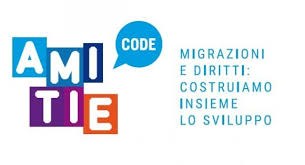EUROPEAID

Under the Erasmus + program, Jean Monnet actions aim to promote the excellence of university studies on the European Union throughout the world. Jean Monnet actions intend to build bridges between EU professors, researchers and policymakers. Emphasis is placed on the study and research in the field of European integration and the understanding of the role of Europe in a globalized world.
It is a project of development education and global citizenship co-funded by the European Union within the framework of the Development Cooperation Instrument: the program that aims to fight poverty in the world and promote fair and sustainable development in Europe.
At the heart of AMITIE CODE is the intertwining of migration, human rights and development. To say that there is a link between development and migration means to remember that migrations derive in large part from the unequal distribution of resources and wealth. It also means accepting that our every choice of consumption has an impact on the development of the "South of the World", and consequently, on migratory flows. Without forgetting that migration is an engine of economic, social and cultural development both for the host communities and for those of origin.
There is no sustainable, fair and lasting development without a consolidation of the rights of populations and communities. Linking the themes of migration and human rights means reflecting on the possible causes of migration, remembering that there are inviolable rights of which every human being is the owner, regardless of his citizenship or the country in which he finds himself.
The project involves 14 partners, including local authorities, universities and associations, from six European countries (Portugal, Spain, France, Italy, Germany and Latvia). A broad partnership that focuses however on the local level, thanks to the privileged role of cities - contexts of interaction and social cohesion - in promoting innovation and change. Cities that are also the nearest and accessible public institutions, those that come into contact in the most direct way with the population and its needs. And this is also the institutions most affected by the changes brought by migratory flows, the economic crisis and the loosening of social cohesion.
The University of Bologna - CIRSFID, guarantees the scientific supervision of the project while the leader is the Municipality of Bologna - Human Rights and Cooperation Office.
AMITIE CODE wants to examine and propose policies for the integration of migrants in the administrative, social and cultural realities of the host societies. And wants to raise awareness on these issues among the general population, starting from young people, but also teachers, officials of local authorities and activists of migrant associations and all those who can and want to increase the impact of the project by sharing its contents.
A web series, a film festival, an app, a website and profiles dedicated to social networks are all tools put in place to engage the public. To which was added the 2015 edition of the Terra di Tutti Art Festival, which in five days brought more than 70 events to Bologna and Reggio Emilia.
Then, in each of the six partner countries, there were paths for informal education in schools and targeted training for teachers and officials, always carried out by involving migrant communities. In addition to educating, sensitizing and informing, the project aims to produce a real impact, a change, experimenting with a human rights-based approach. The partner administrations are thus called to adopt local action plans, born in a participatory way during training courses and designed to make administrative action an instrument of concrete promotion and protection of rights.
Coordinator
Partner
(in Italian)